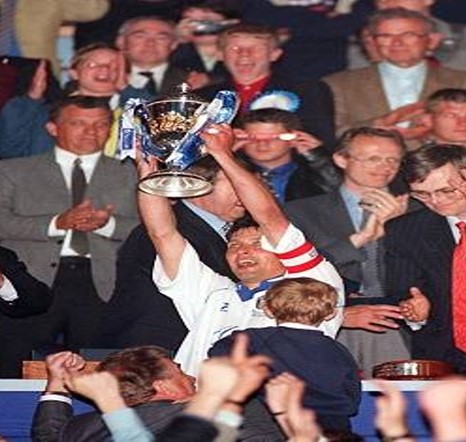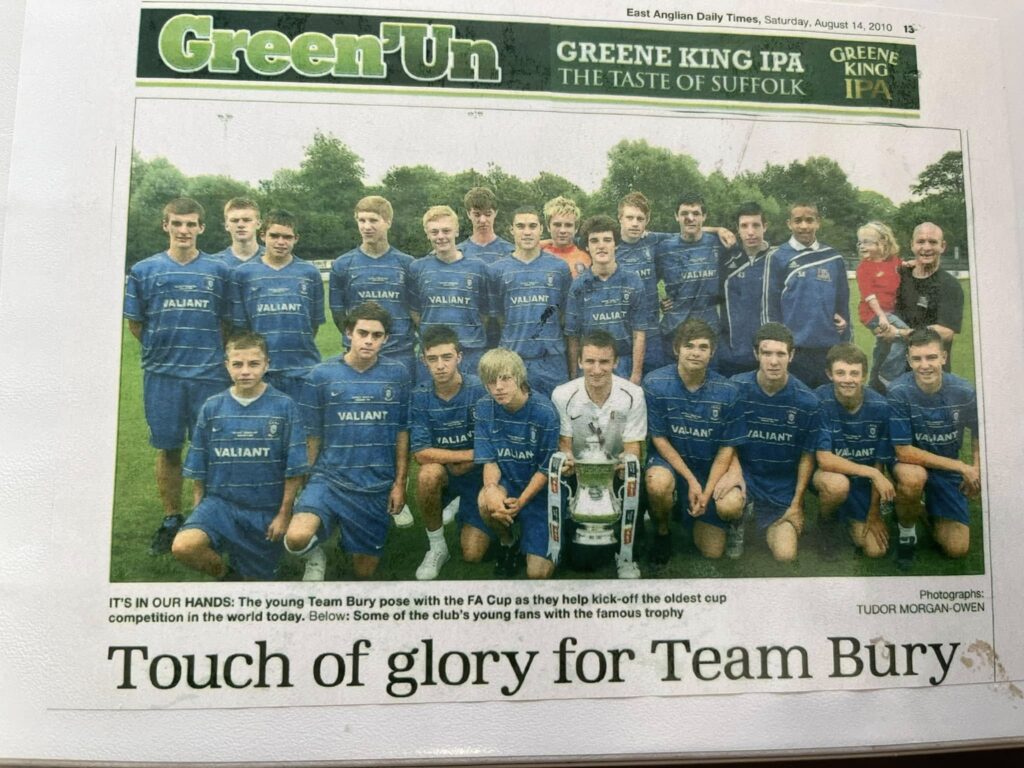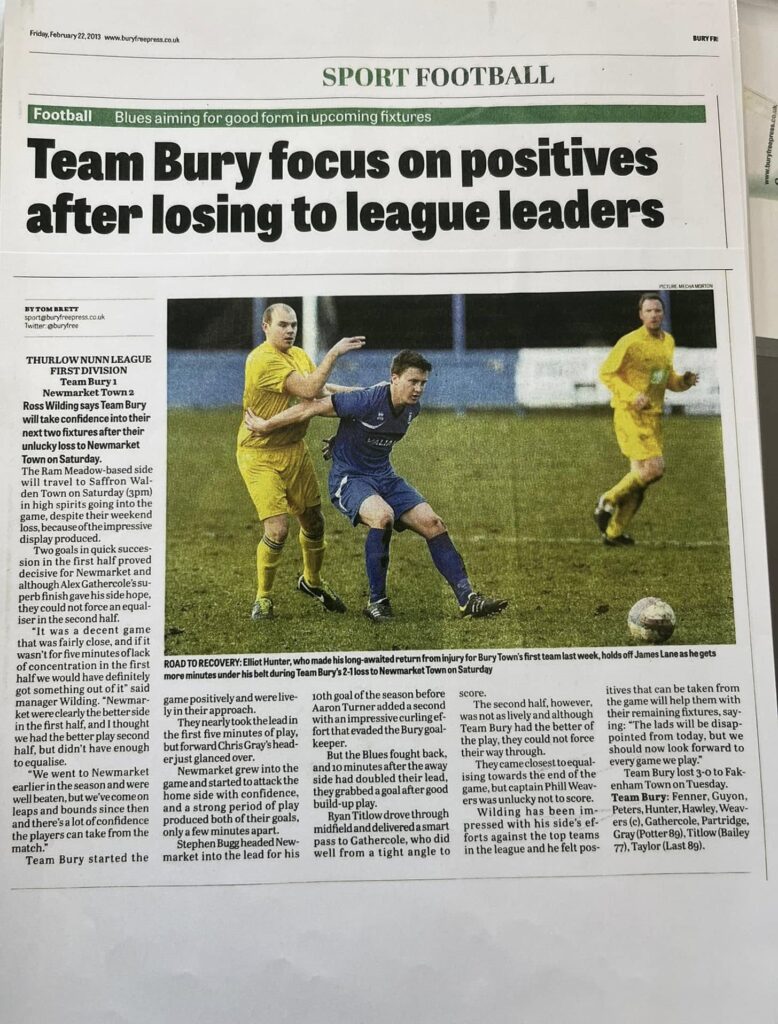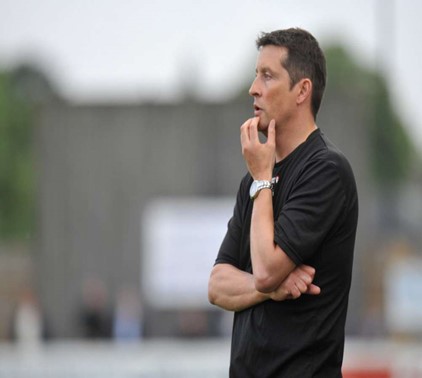Richard Wilkins joined West Suffolk College 25 years ago, after completing his professional football career. He joined both Bury Town FC and the College’s brand-new Football Academy. He remembers the many sporting successes of the College football teams, including Team Bury FC. The Football Academy enabled students to progress in their football careers; Nick Pope and Connor Hall are notable former students. A quarter of a century later, Richard remains committed to his role in the EEG and continues to take pride in his students’ success.
What made you join Eastern Education Group?
After a fifteen-year career as a professional footballer, my playing journey was cut short by a serious neck injury, forcing me to consider a new direction for my future. Shortly afterwards, I was offered the opportunity to manage Bury Town FC, where I went on to serve as manager for fourteen seasons. At my very first training session with the club, I was introduced to Danny Laws, who at the time worked at the college as both a football coach and lecturer, while also managing the Bury Town under-18 team.
Danny explained that, in partnership with the college’s then Vice Principal, Phil Thirkettle, and the local borough council, he had helped to establish one of the country’s pioneering football education programmes. This initiative enabled students to combine daily football coaching sessions with their chosen academic studies. Danny invited me to deliver some coaching sessions within the programme, and this opportunity gradually developed into a full-time role as both a lecturer and academy football coach.
Now, after twenty-five years of service, I remain dedicated to this role and continue to take great pride in contributing to the ongoing success and development of the football education programme.
What was the reason for founding Team Bury FC?
The establishment of Team Bury FC in 2005 (originally called West Suffolk College FC) was motivated by two key objectives. Firstly, it sought to provide West Suffolk College students with the opportunity to compete in senior-level football, enabling them to experience the demands of the adult game while still developing within a structured, supportive, and safe environment overseen by college staff. This not only enhanced the students’ playing opportunities, but also contributed to their personal growth, discipline, and preparation for higher levels of competition.
Secondly, the progression of Bury Town FC’s first team – who had achieved two promotions and were then competing at step three of the non-league pyramid – created a widening gap between the first team and the reserves. The reserve side, restricted to a reserve league with no opportunity for promotion, could no longer provide a realistic pathway for players aspiring to progress into the first team. Team Bury FC was therefore established to bridge this gap, offering a more competitive platform that ensured talented players could continue their development at an appropriate standard.
The creation of Team Bury FC had a significant impact on local football pathways. It strengthened the link between education and sport by aligning academic study with high-level playing opportunities, while also ensuring a sustainable route for player progression into semi-professional football. This model not only benefitted the college and the club, but also contributed positively to the wider community by raising the standard of football provision in the region.

What were the achievements of West Suffolk College, Bury Town and Team Bury through the years?
From the year 2000 onwards, I was fortunate to be part of a period of remarkable footballing success at West Suffolk College. We became English Colleges Football Association (ECFA) National League champions on three occasions in the early 2000s, also securing the ECFA National Cup twice, which marked a golden era for the programme. During this time, five of our students progressed into professional football: Nick Pope, Connor Hall, Jay Dennis, Ryan Cole, and Ben Haddoch, which reflected the high calibre of players we were developing through the college system.
Bury Town FC’s under-18 side, made up entirely of college students, also enjoyed some fantastic moments in the FA Youth Cup. On five occasions, we reached the latter stages of the competition and gained national recognition. One of the standout fixtures was against Blackburn Rovers at Ram Meadow (Bury Town’s home ground), which attracted over 1,000 spectators. Although we lost 2–0 to the Championship side, the experience was unforgettable. Other memorable runs included victories over professional clubs such as Macclesfield Town and Walsall, before meeting Nottingham Forest at the County Ground, where we were narrowly beaten 5–2 in front of more than 2,000 supporters. In 2013, the under-18s recorded another landmark result, defeating local professional side Cambridge United 3–1 at the Abbey Stadium. These achievements demonstrated not only the quality of our coaching, but also the ability of our players to compete with professional opposition.
Team Bury FC further showed the strength of the college’s football programme. Playing in the Suffolk and Essex Border League, we achieved three promotions in just four seasons, reaching step six of the non-league pyramid. This was an outstanding achievement, especially as the team was largely managed and supported by academy staff who gave up their Saturdays to help. One of our most memorable moments came in our first season at that level, when we beat Mildenhall Town in the FA Cup at Ram Meadow in front of more than 1,000 spectators.
From the 2004/05 season onwards, Bury Town FC’s first team also entered a period of sustained success. We secured back-to-back promotions, which took us into the Isthmian League Premier Division — a huge step forward in the club’s journey through the non-league system. The season before this, we had also reached the first-round proper of the FA Cup, where we were narrowly defeated by Alfreton Town FC, which was a proud moment in the club’s history.

More success followed. We finished third in the league and lifted the Suffolk Premier Cup after beating Needham Market 2–0 at Portman Road. The following season we added the Isthmian League Cup to our honours. In 2012/13, we reached the Isthmian play-off semi-final and again won the Suffolk Premier Cup. After a turbulent season both on and off the pitch, we lifted the Suffolk Premier Cup once more with an emphatic 4-1 victory over Felixstowe and Walton FC. Shortly after this success, I decided to bring my fourteen-year tenure as manager to an end, marking the conclusion of a highly significant era in the club’s history.
Looking back, this period showed the upward trajectory of the club and our ability to compete consistently across multiple competitions, firmly establishing Bury Town as one of the leading non-league sides in the region. Together, these accomplishments highlighted the strength of the college football pathway, which successfully combined education with high-level sporting opportunities, and built a strong reputation both regionally and nationally.
What happened to Team Bury?
Unfortunately, just two seasons after my resignation, the club decided to disband Team Bury. This decision was highly disappointing, as it undermined the considerable time, commitment, and dedication invested by staff, players, and volunteers in establishing the team’s success. Beyond the immediate disappointment, the closure represented a significant loss for player development in the area. Team Bury had provided a crucial stepping stone between youth and senior football, offering young players the chance to test themselves at a higher level and, for those with the necessary quality, the opportunity to progress into Bury Town FC’s first team.

Is there a message you would like to share as we celebrate our 100 years of history?
I thoroughly enjoyed, and continue to enjoy, working at Eastern Education Group. It is a truly rewarding place to work, and, while being a lecturer can be challenging at times, the opportunity to have a positive impact on students’ education and future pathways makes the role incredibly fulfilling. The sense of contributing to their personal and academic development is something I value greatly.
Having previously been fortunate enough to earn a living from what was essentially a hobby until the age of 34, transitioning into education has provided me with a new and exciting chapter in my life. This career has not only given me purpose beyond my playing days, but has also allowed me to channel my passion into inspiring and guiding the next generation.




